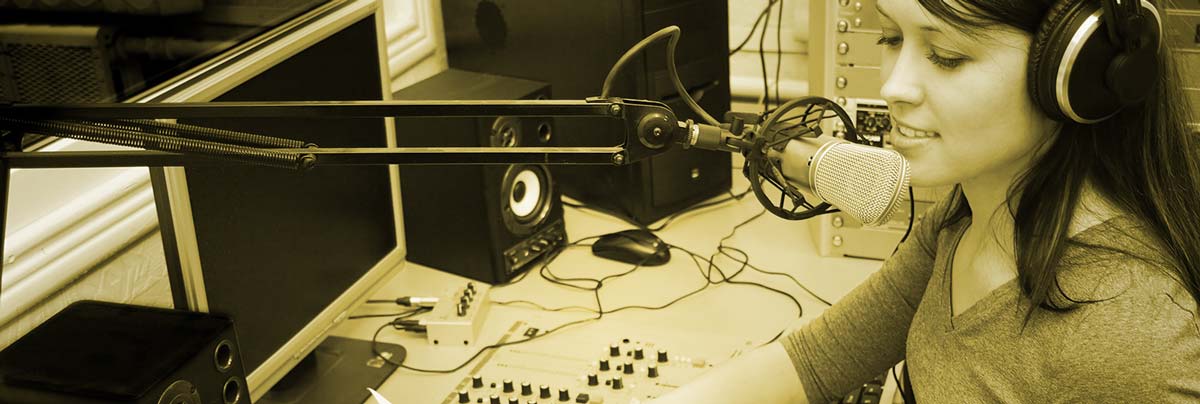Please fill out the following information, and RRFC Admissions will contact you to discuss our program offerings:
Issue #58
by L. Swift and Jeff McQ


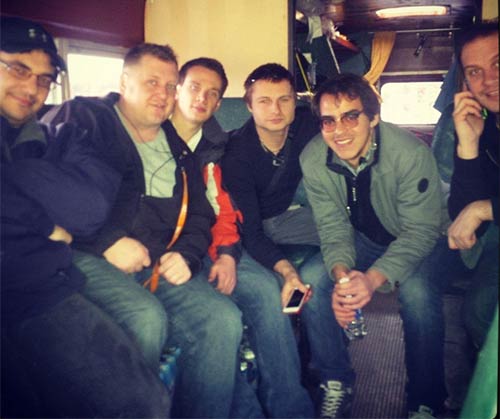 Joe Paciotti has always been something of a go-getter when it comes to his interests in filmmaking. “As a kid, I started out with a little Sony Handycam, messing around with one of my friends,” he says. “When I was nine, I was doing short films with my friends. By high school I took a couple of video production classes and pretty much became the main editor in my class.”
By the time he was 21, Joe had already started his own film company called JPac Productions, taking on a wide range of freelance projects for clients around the Philadelphia area where he lives. But Joe still felt like he needed to up his game—which is what led him to the Film Connection.
“I feel like I’m at the semi-pro level,” says Joe. “I wanted to join the program to give me that extra boost I needed. I figured this program would be a great way for me to gain connections and meet new people who have been doing it for years.”
To help Joe achieve his goals, the Film Connection paired him with mentor Nick Esposito of Backseat Conceptions, a pro-level Philadelphia-based production company that works with such clients as ESPN, The Learning Channel and HBO’s John Oliver, among others. Not long into his apprenticeship, Joe found himself thrown headlong into the inner workings of professional production as a member of the crew for But Deliver Us from Evil, a supernatural action movie with religious themes not unlike Constantine. To Joe, the opportunity to be part of a major production was a milestone. “I was wanting to get on set—that was my main goal from the beginning of this program,” he says. “It was great to finally get on set, really.”
For the first leg of production, Joe traveled with the team from Philly to Raleigh, NC on the “Backseat Bus,” a mobile production unit that Backseat Conceptions built into an actual school bus. While working in various roles on the set as a production assistant, Joe got what could arguably be described as a crash course in all aspects of production, both behind the scenes and on the set itself. “They would analyze pretty much every position,” he says. “I actually wrote down everything I’ve learned, and it’s a pretty long list. Basically I was able to learn every position, what I would and wouldn’t do…pretty much got a good idea of all the different equipment they use and things of that nature. Some of that equipment I look to eventually buy for my own business.” Among the things on his to-buy list: the Red camera, which the team was using to shoot the film. “I loved it,” he says. “Of course they are a little pricey, but they have the full rig, you know, the wireless focus and wireless monitors and all that, which is pretty cool.”
Joe says working on the set also helped him clarify his own interests as a filmmaker, and where he wants to put his focus, which is primarily on the production/directing side. “I got an idea of the things I wouldn’t want to do, and the things I would want to do,” he says. “Anything script related I kind of want to stay away from. But I definitely want to be in the camera department or eventually work my way up to director or assistant director, swing for positions in that category… Not that I’m a bad writer, but I would just rather stick to the production side.”
Now back in Philadelphia, Joe says he is staying busy finishing up his Film Connection apprenticeship while continuing to work on his own film business. With about seven different projects of his own currently in the works, he can already see how working with Nick Esposito and Backseat have helped to up his game. “Working with Backseat, I was able to take some of the ways they run things and incorporate it into my own business. Definitely helped me a lot so far.”
Perhaps just as important to Joe’s career are the relationships made along the way, as his apprenticeship has given him a stronger connection with the film community in general. He even hints at an ongoing relationship with his mentor after graduation. “Nick said there is going to be more in the future, that he plans to get me in the camera department, which will be nice,” he says.
Joe Paciotti has always been something of a go-getter when it comes to his interests in filmmaking. “As a kid, I started out with a little Sony Handycam, messing around with one of my friends,” he says. “When I was nine, I was doing short films with my friends. By high school I took a couple of video production classes and pretty much became the main editor in my class.”
By the time he was 21, Joe had already started his own film company called JPac Productions, taking on a wide range of freelance projects for clients around the Philadelphia area where he lives. But Joe still felt like he needed to up his game—which is what led him to the Film Connection.
“I feel like I’m at the semi-pro level,” says Joe. “I wanted to join the program to give me that extra boost I needed. I figured this program would be a great way for me to gain connections and meet new people who have been doing it for years.”
To help Joe achieve his goals, the Film Connection paired him with mentor Nick Esposito of Backseat Conceptions, a pro-level Philadelphia-based production company that works with such clients as ESPN, The Learning Channel and HBO’s John Oliver, among others. Not long into his apprenticeship, Joe found himself thrown headlong into the inner workings of professional production as a member of the crew for But Deliver Us from Evil, a supernatural action movie with religious themes not unlike Constantine. To Joe, the opportunity to be part of a major production was a milestone. “I was wanting to get on set—that was my main goal from the beginning of this program,” he says. “It was great to finally get on set, really.”
For the first leg of production, Joe traveled with the team from Philly to Raleigh, NC on the “Backseat Bus,” a mobile production unit that Backseat Conceptions built into an actual school bus. While working in various roles on the set as a production assistant, Joe got what could arguably be described as a crash course in all aspects of production, both behind the scenes and on the set itself. “They would analyze pretty much every position,” he says. “I actually wrote down everything I’ve learned, and it’s a pretty long list. Basically I was able to learn every position, what I would and wouldn’t do…pretty much got a good idea of all the different equipment they use and things of that nature. Some of that equipment I look to eventually buy for my own business.” Among the things on his to-buy list: the Red camera, which the team was using to shoot the film. “I loved it,” he says. “Of course they are a little pricey, but they have the full rig, you know, the wireless focus and wireless monitors and all that, which is pretty cool.”
Joe says working on the set also helped him clarify his own interests as a filmmaker, and where he wants to put his focus, which is primarily on the production/directing side. “I got an idea of the things I wouldn’t want to do, and the things I would want to do,” he says. “Anything script related I kind of want to stay away from. But I definitely want to be in the camera department or eventually work my way up to director or assistant director, swing for positions in that category… Not that I’m a bad writer, but I would just rather stick to the production side.”
Now back in Philadelphia, Joe says he is staying busy finishing up his Film Connection apprenticeship while continuing to work on his own film business. With about seven different projects of his own currently in the works, he can already see how working with Nick Esposito and Backseat have helped to up his game. “Working with Backseat, I was able to take some of the ways they run things and incorporate it into my own business. Definitely helped me a lot so far.”
Perhaps just as important to Joe’s career are the relationships made along the way, as his apprenticeship has given him a stronger connection with the film community in general. He even hints at an ongoing relationship with his mentor after graduation. “Nick said there is going to be more in the future, that he plans to get me in the camera department, which will be nice,” he says.
 Under the direction of her screenwriting mentor, noted producer Judi Levine, Anne Marie Cummings is learning the inner-workings of taking a stylistic novel and adapting it into a screenplay. We’d love to tell you more, but it’s top secret!
Under the direction of her screenwriting mentor, noted producer Judi Levine, Anne Marie Cummings is learning the inner-workings of taking a stylistic novel and adapting it into a screenplay. We’d love to tell you more, but it’s top secret!
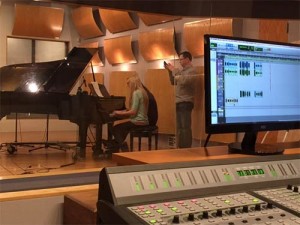 At Audible Images in Pittsburgh, PA, Recording Connection student AJ Delmonico is on hand for recording a piano/vocal duo. He’s witnessing the working relationship between engineer and artists and getting acquainted with the creative intricacies that help artists fuel a productive session. Half of the tracks are already onto mixing, and AJ says, “They sound as beautiful as audibly possible.”
At Audible Images in Pittsburgh, PA, Recording Connection student AJ Delmonico is on hand for recording a piano/vocal duo. He’s witnessing the working relationship between engineer and artists and getting acquainted with the creative intricacies that help artists fuel a productive session. Half of the tracks are already onto mixing, and AJ says, “They sound as beautiful as audibly possible.”
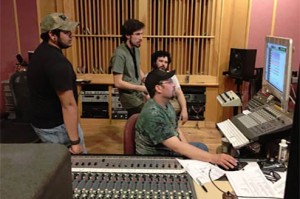 Wayne E. Hill, Recording Connection apprentice at Salmon Peak Recording Studio in San Antonio, TX, is attending a live band session recording manned by fellow RC students Jacob Muniz & Ray Cole.
Wayne E. Hill, Recording Connection apprentice at Salmon Peak Recording Studio in San Antonio, TX, is attending a live band session recording manned by fellow RC students Jacob Muniz & Ray Cole.
 Radio Connection student Liz Faux is getting a taste of the business side of radio, joining her mentor Sean “Rabbi” Tyszler in a new music meeting where they’re listening to demos and working out what goes and what stays and plays in the current rotation.
Radio Connection student Liz Faux is getting a taste of the business side of radio, joining her mentor Sean “Rabbi” Tyszler in a new music meeting where they’re listening to demos and working out what goes and what stays and plays in the current rotation.
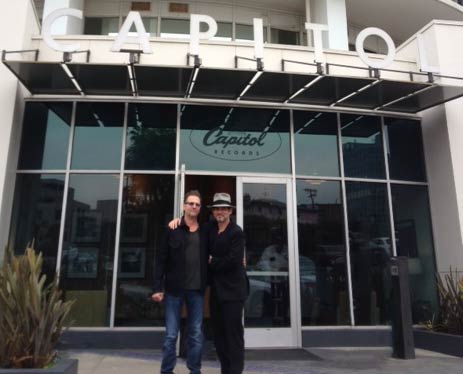 As part of the Recording Connections ongoing charge to “connect” our students with the movers and shakers of the industry, last week our own Jimi Petulla and Brian Kraft were on an exploratory mission and headed over to Hollywood to the legendary Capitol Studios, which has been a staple of the recording industry for over half a century. Iconic artists like Frank Sinatra, Nat King Cole and The Beach Boys first gave life to Capitol Studio’s rooms and to this day, major icons of popular music continue to record their in their wake.
As part of the Recording Connections ongoing charge to “connect” our students with the movers and shakers of the industry, last week our own Jimi Petulla and Brian Kraft were on an exploratory mission and headed over to Hollywood to the legendary Capitol Studios, which has been a staple of the recording industry for over half a century. Iconic artists like Frank Sinatra, Nat King Cole and The Beach Boys first gave life to Capitol Studio’s rooms and to this day, major icons of popular music continue to record their in their wake.
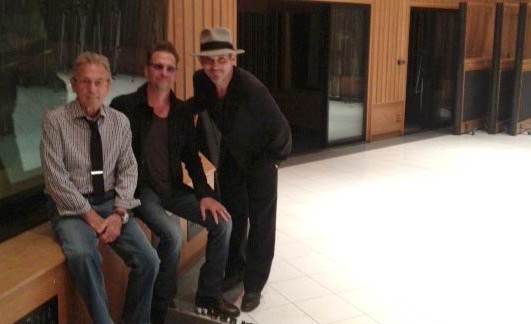 First stop for Jimi and Brian was in Capitol Studio “C” to meet up with 23-time GRAMMY® Award winning engineer, producer and mixer Al Schmitt. Al’s resume reads like the Who’s Who of the music industry as he has worked with artists like Steely Dan, Frank Sinatra, Paul McCartney, Madonna, Michael Bublé, Diana Krall, Quincy Jones, Neil Young, Elvis Costello, Bob Dylan, Norah Jones and Ray Charles to name a few. Jimi and Brian talked to Al about the Recording Connection Mentoring Program and listened to this legend talk about his current work and thoughts on audio education.
First stop for Jimi and Brian was in Capitol Studio “C” to meet up with 23-time GRAMMY® Award winning engineer, producer and mixer Al Schmitt. Al’s resume reads like the Who’s Who of the music industry as he has worked with artists like Steely Dan, Frank Sinatra, Paul McCartney, Madonna, Michael Bublé, Diana Krall, Quincy Jones, Neil Young, Elvis Costello, Bob Dylan, Norah Jones and Ray Charles to name a few. Jimi and Brian talked to Al about the Recording Connection Mentoring Program and listened to this legend talk about his current work and thoughts on audio education.
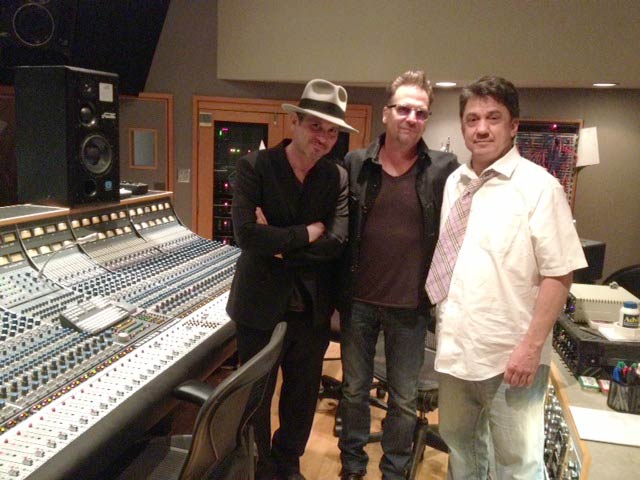 Next stop was directly across the hall in Studio “B,” where Jimi and Brian met up with producer, engineer, mixer, technologist, consultant, entrepreneur and multi-GRAMMY Award winner Niko Bolas, who was right in the middle of tracking Richie Sambora’s latest record. The list of artists Niko has worked with is long and varied: Melissa Etheridge, Warren Zevon, Kiss, Rod Stewart, Barbra Streisand, Billy Joel, Fiona Apple, Toto, Tracy Chapman, The Jacksons, John Mayer (for his contribution to Disney/Pixar’s Cars), Disney’s Frozen: The Songs, Demi Lovato, The Mavericks, OneRepublic, Zedd and scores of others. But his closest association is very likely with Neil Young; Bolas has been producer and/or engineer on a dozen or so of Young’s LP’s over the last three decades, including Freedom (1989), Ragged Glory (1990), Living With War (2006) and Young’s most recent release Storytone (2014), which he recorded with Al Schmitt. Niko greeted Jimi and Brian with open arms and spent time discussing the mentorship program and his views on what it takes to become an apprentice at a facility like Capitol. It was truly an inspiring visit with invaluable information. Stay tuned for more…
Next stop was directly across the hall in Studio “B,” where Jimi and Brian met up with producer, engineer, mixer, technologist, consultant, entrepreneur and multi-GRAMMY Award winner Niko Bolas, who was right in the middle of tracking Richie Sambora’s latest record. The list of artists Niko has worked with is long and varied: Melissa Etheridge, Warren Zevon, Kiss, Rod Stewart, Barbra Streisand, Billy Joel, Fiona Apple, Toto, Tracy Chapman, The Jacksons, John Mayer (for his contribution to Disney/Pixar’s Cars), Disney’s Frozen: The Songs, Demi Lovato, The Mavericks, OneRepublic, Zedd and scores of others. But his closest association is very likely with Neil Young; Bolas has been producer and/or engineer on a dozen or so of Young’s LP’s over the last three decades, including Freedom (1989), Ragged Glory (1990), Living With War (2006) and Young’s most recent release Storytone (2014), which he recorded with Al Schmitt. Niko greeted Jimi and Brian with open arms and spent time discussing the mentorship program and his views on what it takes to become an apprentice at a facility like Capitol. It was truly an inspiring visit with invaluable information. Stay tuned for more…
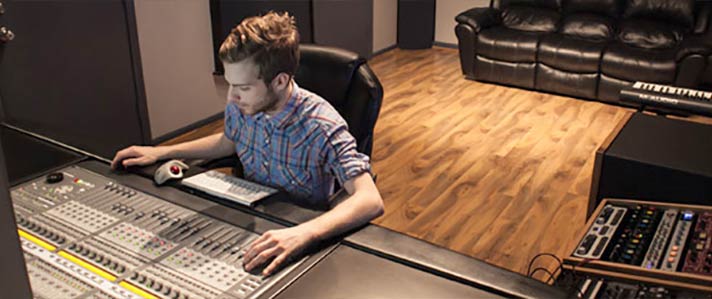 “Once that light bulb goes off,” John continues, “and they understand the way that all these frequencies relate, how to get the most out of the kick drum, how to get the most out sub bass, how to get the most out of your high-end…they’re like, ‘Okay, I could do this actually with this other track I’m working on for a friend that does hip-hop.’…Once that thing clicks in their head and it all makes sense, those things don’t just apply to their specific interests. They apply to everything.”
While John obviously has no problem adapting the apprenticeship course to each student’s interests, he makes sure they understand how these concepts apply across the board. To him, in fact, it’s critical to be able to apply universal mix theory across genres, especially if someone plans to produce.
“My style of teaching centers around tone, production value, the kind of gear that really facilitates that production value,” he says. “To be a producer of music, I think you have to have a really wide range of appreciation for different kinds of music, so that if a project walks through the door and it’s country, that you know what you’re doing and you understand the language well enough to where if you’re describing this record that he’s into, you know what parts of that record that you can bring into his sound…I want these kids to have the sensibility to be able to talk to a client and to communicate effectively enough to know what they’re looking for, and to be able to contribute something and really add something to the project.”
When it comes to the best way to learn these things, John is adamant about the one-on-one learning approach, as opposed to the classroom format. “The problem I found with college was I was always the most advanced kid in my class,” he says. “As you can imagine, the teacher is not going to keep my pace and then leave behind the slowest kids in the class. The attention was paid to the students who weren’t mastering the information yet…It was frustrating for me, because I plateaued really early on, and still had a year left to go. I had to ask very direct questions to get something out of that day’s class, and I’m spending x amount of dollars to be there.
“Once that light bulb goes off,” John continues, “and they understand the way that all these frequencies relate, how to get the most out of the kick drum, how to get the most out sub bass, how to get the most out of your high-end…they’re like, ‘Okay, I could do this actually with this other track I’m working on for a friend that does hip-hop.’…Once that thing clicks in their head and it all makes sense, those things don’t just apply to their specific interests. They apply to everything.”
While John obviously has no problem adapting the apprenticeship course to each student’s interests, he makes sure they understand how these concepts apply across the board. To him, in fact, it’s critical to be able to apply universal mix theory across genres, especially if someone plans to produce.
“My style of teaching centers around tone, production value, the kind of gear that really facilitates that production value,” he says. “To be a producer of music, I think you have to have a really wide range of appreciation for different kinds of music, so that if a project walks through the door and it’s country, that you know what you’re doing and you understand the language well enough to where if you’re describing this record that he’s into, you know what parts of that record that you can bring into his sound…I want these kids to have the sensibility to be able to talk to a client and to communicate effectively enough to know what they’re looking for, and to be able to contribute something and really add something to the project.”
When it comes to the best way to learn these things, John is adamant about the one-on-one learning approach, as opposed to the classroom format. “The problem I found with college was I was always the most advanced kid in my class,” he says. “As you can imagine, the teacher is not going to keep my pace and then leave behind the slowest kids in the class. The attention was paid to the students who weren’t mastering the information yet…It was frustrating for me, because I plateaued really early on, and still had a year left to go. I had to ask very direct questions to get something out of that day’s class, and I’m spending x amount of dollars to be there.
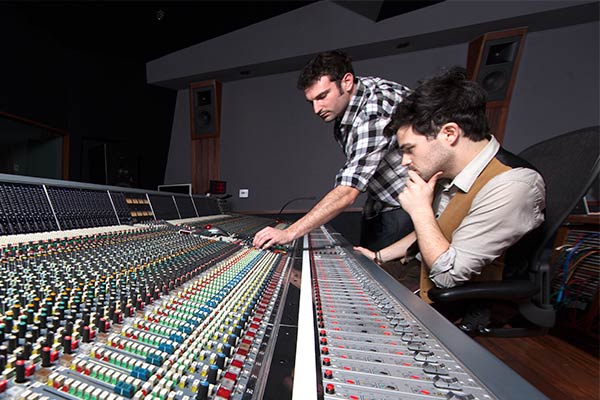 “The one-on-one approach just allows us to focus on very specific goals for the students. They have an end result, and we want to get them there. There’s no distraction in terms of someone being a lot less prepared than them, or someone being a lot further along. Kind of their pace. We spend a good amount of time with these students to where, at the end, they’re getting closer to that result.”
And of course, John says, training apprentices on-the-job is good for the studio, as well. “It helps to have educated students around in a work environment like ours, because there is no shortage of work to do…The more educated hands we have on deck, the better service we can provide to our clients. It never hurts to have a person who is competent around who can walk client through the studio and give a tour, or to have someone be able to set up a drum kit and me not even be in the room… It’s a 2-way street, you know? They get the tools necessary to be able to pursue that next step in their careers, and we get educated students who are really helpful in this kind of environment.”
In John’s eyes, at the end of the day, the combining of universal mix theory with personalized training, one-on-one attention, and the hands-on experience of the studio all help to give his students a fighting chance to make it in the industry. “We’re trying to provide these kids with an opportunity and a skillset that’s going to enable them to really follow their dream,” he says. “As silly as that sounds, that really is what we’re trying to do.”
“The one-on-one approach just allows us to focus on very specific goals for the students. They have an end result, and we want to get them there. There’s no distraction in terms of someone being a lot less prepared than them, or someone being a lot further along. Kind of their pace. We spend a good amount of time with these students to where, at the end, they’re getting closer to that result.”
And of course, John says, training apprentices on-the-job is good for the studio, as well. “It helps to have educated students around in a work environment like ours, because there is no shortage of work to do…The more educated hands we have on deck, the better service we can provide to our clients. It never hurts to have a person who is competent around who can walk client through the studio and give a tour, or to have someone be able to set up a drum kit and me not even be in the room… It’s a 2-way street, you know? They get the tools necessary to be able to pursue that next step in their careers, and we get educated students who are really helpful in this kind of environment.”
In John’s eyes, at the end of the day, the combining of universal mix theory with personalized training, one-on-one attention, and the hands-on experience of the studio all help to give his students a fighting chance to make it in the industry. “We’re trying to provide these kids with an opportunity and a skillset that’s going to enable them to really follow their dream,” he says. “As silly as that sounds, that really is what we’re trying to do.”
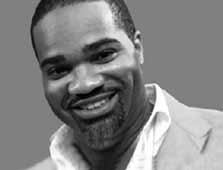 “When I heard about CASA Schools’s approach to culinary education I was blown away. I just wished that this sort of thing was available before I spent $50,000 for culinary school! They promised me a management position as soon as I graduated. I found out that that was a lie. On-the-job experience is the only way to go. The use of the culinary techniques and cooking methods day in and day out, from one scenario to the next is the best way to learn. Doing one recipe a day and paying over $200 a day is bull…”
— Troy Artis , Owner/ Operator of Chef Troy Personal Chef and Catering Services, Los Angeles, CA
“When I heard about CASA Schools’s approach to culinary education I was blown away. I just wished that this sort of thing was available before I spent $50,000 for culinary school! They promised me a management position as soon as I graduated. I found out that that was a lie. On-the-job experience is the only way to go. The use of the culinary techniques and cooking methods day in and day out, from one scenario to the next is the best way to learn. Doing one recipe a day and paying over $200 a day is bull…”
— Troy Artis , Owner/ Operator of Chef Troy Personal Chef and Catering Services, Los Angeles, CA

RRFC is education upgraded for the 21st century.
Get the latest career advice, insider production tips, and more!
Please fill out the following information, and RRFC Admissions will contact you to discuss our program offerings:
Stay in the Loop: Subscribe for RRFC news & updates!
© 2025 Recording Radio Film Connection & CASA Schools. All Rights Reserved.

